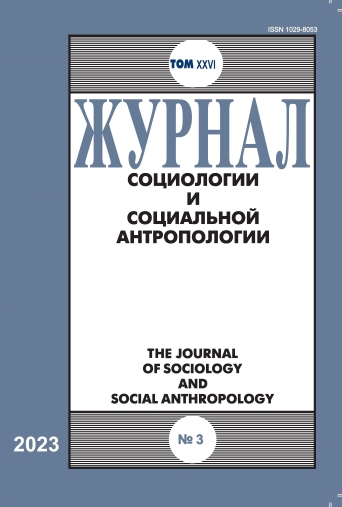Transformation of Anti-Digital Rhetoric in the Media of Russian Orthodox Nationalists: from Religious to Political
Abstract
The current “conservative turn”, which has been a trend of Russia's policy since 2011, due to its scale, inevitably influences the transformations of the rhetoric used by any political movement in Russia. The extant of this influence is predictably higher in the case of conservative and religious movements, which are generally pro-government. By virtue of their loyalist character, they had to reorganize their rhetoric according to the mainstream of the state's public discourse. This article is an attempt to analyse the results of this process. In the article we will analyse the basic concepts of modern digital phobic rhetoric used by Orthodox nationalist organisations in Russia, trace the transformations of their public digital phobic rhetoric, and highlight the most popular ideas constituting and corroborating the digital phobic discourse within the politically active Orthodox fundamentalist community. The changes will be highlighted through the comparative analysis of digital phobic rhetoric of Russian Orthodox nationalists of the 1990s and the modern representatives of this movement. The analysis will be performed through defining the relative importance of various groups of political and conspirological theories legitimating the digital phobic discourse within the community of politically active Orthodox fundamentalists at the present time and back in the 1990s. The method of the research is based on content analysis, concerning the frequency of word-markers characteristic of a ideological theory or conception. This analysis lets to define the prevailing at the present time narrative of Russian Orthodox nationalism, identify the value-based guidelines of digital phobic movement within the realm of Russian Orthodox nationalism. In turn, it will provide the understanding of the influence of the "conservative turn" in Russia's policy on the public rhetoric of Russian Orthodox nationalism, exemplified by the digital phobic rhetoric. Its ideological basis will be also identified, along with the essential features of modern Russian Orthodox COVID dissidence, which is closely linked with the resentment provoked in some Russian Orthodox circles by the digitalisation.
References
Верховский А.М. (2003) Политическое православие. Русские православные фундаменталисты и националисты, 1995–2001 гг. М.: Центр «Сова».
Верховский А.М. (2005) Радикальный православный антиглобализм. М.: Издательство Института социологии РАН.
Верховский А.М. (2007) Верхи и низы русского национализма. М.: Центр «Сова».
Говорун К. (2005) Интерпретируя «русский мир». Русский журнал, 09.02.2015.
Зыгмонт А.И. (2012) О феномене «царебожия» в современной религиозной культуре России. Вестник РГГУ. Серия «Культурология. Искусствоведение. Музеология», 11: 138–145.
Кнорре Б., Засядько А. (2021) Православный антиэкуменизм 2.0: мобилизационная модель, секьюретизация и реваншизм. Государство, религия, церковь в России и за рубежом, 39(2): 277–317.
Кнорре Б.К., Мурашова А.А. (2021) «В начале было Слово…», а в конце будет число? Православие и антицифровой протест в России: с 1990-х до коронавируса. Мир России, 30(2): 146–166. https://doi.org/10.17323/1811-038X-2021-30-2-146-166.
Митрофанова А.В. (2004) Политизация «православного мира». М.: Наука.
Митрохин Н.А. (2007) Инфраструктура поддержки православной эсхатологии в современной РПЦ. История и современность. М.: Франко-российский центр гуманитарных и общественных наук.
Бергер П. (2012) Фальсифицированная секуляризация. Государство, религия, церковь в России и за рубежом, 30(2): 8–20.
Смит Э. (2004) Национализм и модернизм. Критический обзор современных теорий наций и национализма. М.: Праксис.
Тесля А.А. (2019) Истинно русские люди. История русского национализма. М.: Рипол-Классик.
Узланер Д. (2020) Постсекулярный поворот. Как мыслить о религии в XXI веке. М.: Изд-во Института Гайдара.
Умланд А. (2007) Три разновидности постсоветского фашизма: концептуальные и контекстуальные проблемы интерпретации современного русского ультранационализма. М. Ларюэль (ред.) Современные интерпретации русского национализма. Штутгарт, Ганновер: ibidem-Verlag: 129–170.
Ухватова М.В. (2018) Напутствия охранителей (религиозная риторика на инаугурациях российских губернаторов). Полития, 2: 84–101.
Шнирельман В.А. (2017) Колено Даново. Эсхатология и антисемитизм в современной России. М.: ББИ.
Яблоков И. (2021) Русская культура заговора. Конспирологический теории на постсоветском пространстве. М.: Альпина нон-фикшн.
Blakkisrud H. (2016) Blurring the boundary between civic and ethnic: The Kremlin’s new approach to national identity under Putin’s third term In: The New Russian Nationalism: Imperialism, Ethnicity and Authoritarianism: 2000–2015. Edinburg: Edinburg University Press: 249–274.
Karpov V., Lisovskaya E., Barry D. (2012) Ethnodoxy: How Popular Ideologies Fuse Religious and Ethnic Identities. Journal for the Scientific Study of Religion, 51(4): 638–655.
Mitrofanova A. (2009) Russian Ethnic Nationalism and Religion Today. In: The New Russian Nationalism. Imperialism, Ethnicity and Authoritarianism: 2000–2015. Edinburg: Edinburg University Press: 104–131.
Pain E. (2016) The imperial syndrome and its influence on Russian nationalism. The New Russian Nationalism. Imperialism, Ethnicity and Authoritarianism: 2000–2015. Edinburg: Edinburg University Press: 46–74.
Rock S. (2002) 'Militant Piety': Fundamentalist Tendencies in the Russian Orthodox Brotherhood Movement. Occasional Papers on Religion in Eastern Europe, 22(3).
Wawrzonek M. (2016) “Russkiy mir”: A Conceptual Model of the “Orthodox Civilization”. In: Wawrzonek M., Bekus N., Korzeniewska-Wiszniewska M. Orthodoxy Versus Post-Communism?: Belarus, Serbia, Ukraine and the Russkiy Mir. Cambridge Scholars Publishing: 37–70.

